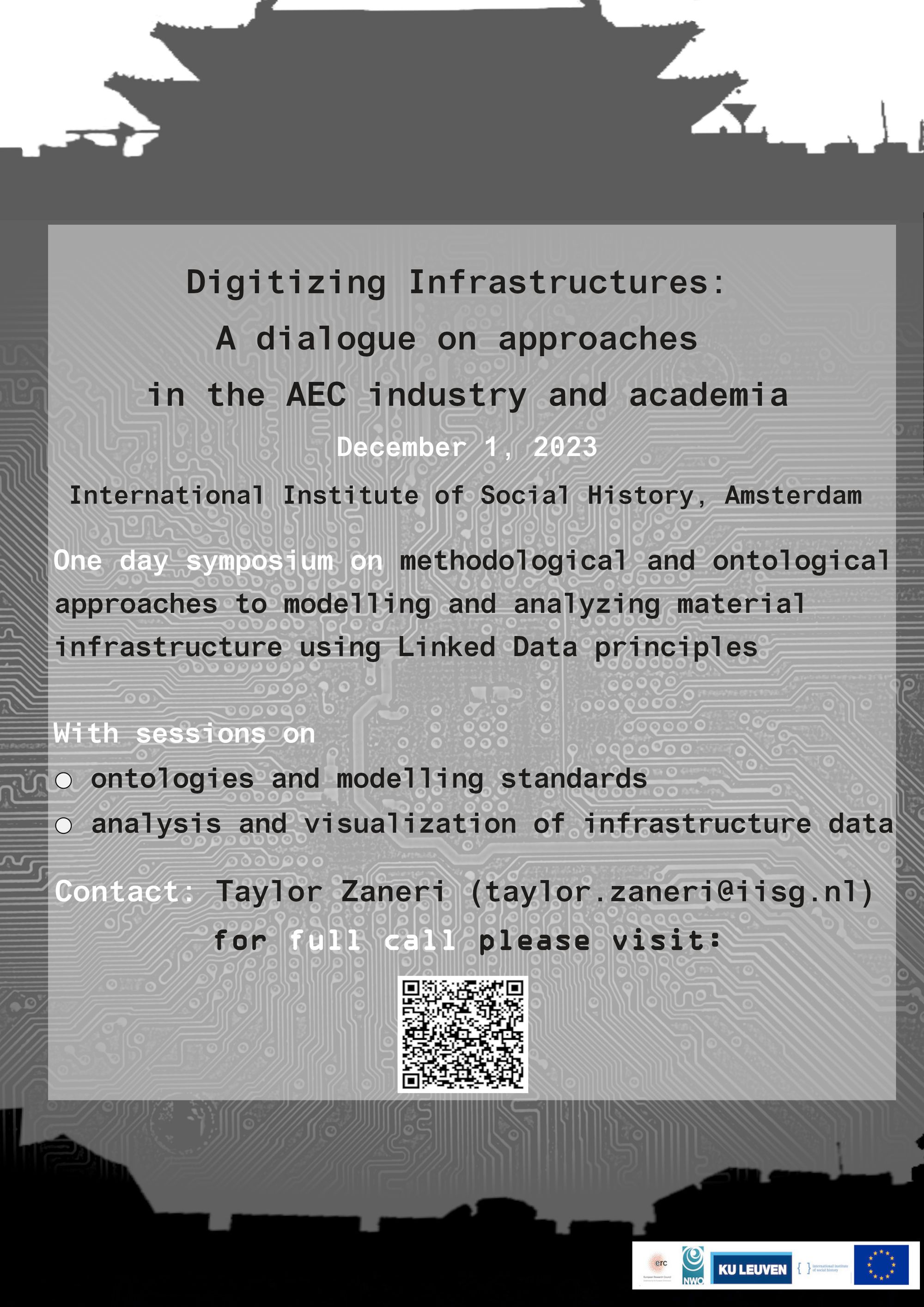
In the past ten years the number of initiatives that have collected and analyzed rich datasets regarding physical infrastructures has grown substantially. One of the major challenges with these initiatives is to facilitate and foster reuse and integration of data – across different projects and across different disciplines. Linked Data and Semantic Web principles are increasingly applied by researchers and industries as a means to ensure that data is findable, accessible, interoperable, and reusable within and across different fields. This symposium will bring together experts from industry and academia to discuss methodological and ontological approaches to modelling and analyzing material infrastructure using Linked Data principles and together distill a number of best practices. This event is sponsored by the NWO-funded project “The Lives and Afterlives of Material Infrastructures in Southeast China”. Researchers in this and an allied ERC project based at KU Leuven aim to map the appearance and disappearance of large-scale infrastructures on an open access spatial analysis platform based on the digital annotation of the extant textual and archaeological record. Our goal is to promote a dialogue between industry, government institutions, and academia and to facilitate the development of broadly applicable ontologies and methodologies.
For this symposium, we invite participants to speak in one of two sessions.
The first session will address ontologies and modelling standards. We ask that participants speak about their own work and address the following questions:
• What are the key decisions that need to be made when modelling infrastructure,
• How can different data sources be integrated?
• How can changes in infrastructure use, function, and materials be described?
The second session will be devoted to the analysis and visualization of infrastructure data, in which we would like participants to discuss:
• How they analyze infrastructure data,
• what visualizations they generate, and
• what software, services or technologies they use.
Speakers will give a brief overview of their work in relation to the session theme (8-10 minutes). This will be followed by a larger roundtable discussion at the end of each session.
Practical information
Date: Friday 1 December 2023
Location:
International Institute of Social History
Cruquiusweg 31 1019 AT
Amsterdam
Organizers
Taylor Zaneri [email protected]
Sander Stolk [email protected]
Hilde De Weerdt [email protected]
Program
Location: Spinhuis Room 2.18 Oudezijds Achterburgwal 185, 1012 CJ Amsterdam
13:00 Welcome and Introduction: Hilde De Weerdt (KU Leuven)
13:15-14:15
Session 1: Ontologies and Modelling Standards: Chair Sander Stolk (Semmtech)
- Wouter Lubbers (Lead Consultant and Linked Data Specialist, Semmtech): Standardized Methodologies and Ontologies as a Driver for Digitization: Adopting Systems Engineering Principles and NEN2660 for Representing Infrastructure Assets
- Alexander Worp (Asset Information Manager, Waternet): Using Ontologies in Integrating Asset information on infrastructure
- Bart Holterman (Georg-August University Göttingen):The Modelling Principles of the Viabundus Dataset
- Hilde De Weerdt and Dawn Zhuang (KU Leuven) : An Event-based History of Chinese Material Infrastructures: An Ontology and a Plan for Open Data Enrichment
- Esra Bektas (Senior Research Scientist, TNO): Modelling Multi-Criteria to Enable Decision Making for Infrastructure
14:15-14:45 Roundtable Discussion
14:45-15:10 Break
15:10-16:00
Session 2: Analysis and Visualization: Chair Taylor Zaneri (IISH)
- Jaap Bakker (Coordinating Specialist Advisor on Asset Management and Data Integration, Rijkswaterstaat): Dealing with distributed data at Rijkswaterstaat
- Pau de Soto, Tom Brughmans and Adam Pazout (Universitat Autònoma de Barcelona): Understanding Past Territories Through Their Transportation Networks: The Case of the Roman Empire
- Richard Zijdeman (IISH): Unifying and Augmenting (Data) Collections Metadata as Linked Open Data Using Commercial and Community Software
- Stephen Gadd (Docuracy Ltd): Markets and Roads in Early Modern England: a World Historical Perspective
16:00-16:30 Roundtable Discussion
16:30 Concluding Remarks
Watch online here: Teams Link